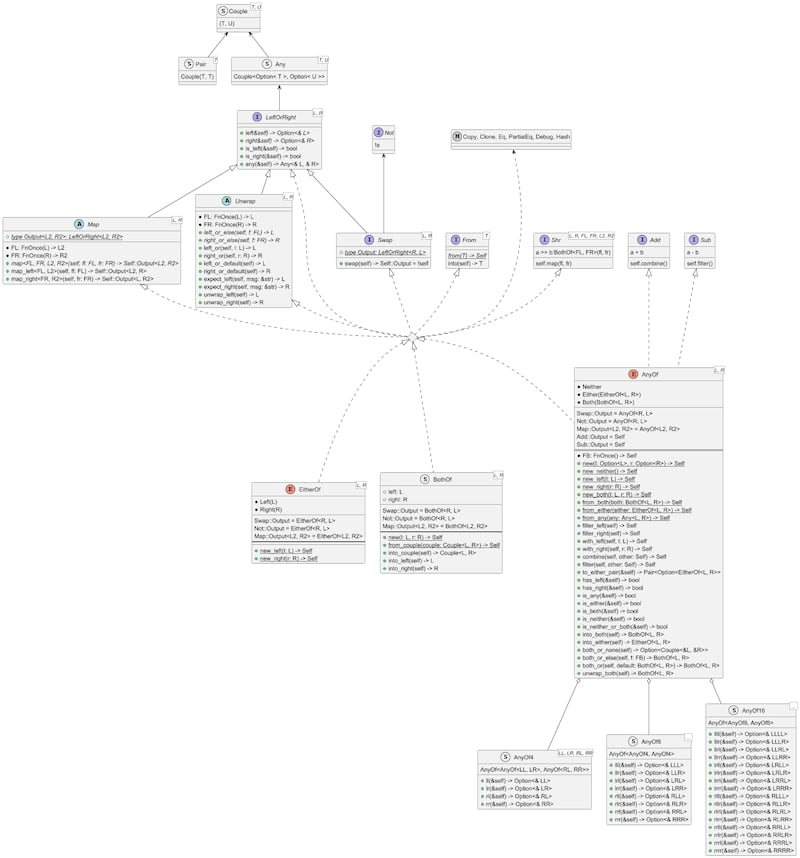19 releases (12 stable)
| 2.1.2 | Mar 26, 2025 |
|---|---|
| 2.1.1 | Feb 12, 2025 |
| 1.3.4 | Feb 9, 2025 |
| 0.11.0 | Feb 6, 2025 |
| 0.9.2 | Feb 6, 2025 |
#270 in Rust patterns
117 downloads per month
310KB
1K
SLoC
AnyOf : a versatile type for Rust
This project implements a flexible Algebraic Data Type : AnyOf.
AnyOf is an optional sum of product of two types,
which enables clear and safe data representations in functional and type-driven programming.
Overview
At the core of the project is the AnyOf enum, a general-purpose algebraic type,
alongside additional types as EitherOf and BothOf.
These abstractions allow to express dynamic states, optional values, and branching logic in a natural and explicit manner.
Key Types
-
AnyOf<L, R>- A flexible type that represents four possible states:
Neither: No value is present.Either:Left: Only the left value is present.Right: Only the right value is present.
Both: Both values are present.
- It combines variants in the following way:
AnyOf<L, R> = Neither | Either(EitherOf<L, R>) | Both(BothOf<L, R>) - Its cases are:
AnyOf(l: L, r: R) = Neither | Either(Left(l)) | Either(Right(r)) | Both(BothOf{left = l, right = r}) - This type can also be viewed as a product of two optional types:
Cases :AnyOf<L, R>::any() -> (Option<L>, Option<R>)Neither.any()returns(None, None)Left(L).any()returns(Some(L), None)Right(R).any()returns(None, Some(R))Both(L, R).any()returns(Some(L), Some(R))
- A flexible type that represents four possible states:
-
EitherOf<L, R>- A simple sum type representing one of two values.
- Variants:
Left(L)Right(R)
- Ideal for binary decision-making.
- Implements
any()too :Left(L).any()returns(Some(L), None)Right(R).any()returns(None, Some(R))
- It is the type :
EitherOf<L, R> = Left(L) | Right(R)
-
BothOf<L, R>- A product type that pairs two values,
leftandright, of potentially different types. - Implements
any()too :BothOf{ left: L, right: R }.any()returns(Some(L), Some(R))
- It is the type:
BothOf<L, R> = {left: L, right: R} - It can be transformed into a tuple with:
into_couple(self) -> Couple<L, R>, - And can be transformed from a tuple with:
from_couple(Couple<L, R>) -> Self,
- A product type that pairs two values,
-
Enhanced Type Composition
- A
Couple<T, U>is a(T, U), - A
Pair<T>is aCouple<T, T>, - An
Any<T, U>is aCouple<Option<T>, Option<U>>, - Complex types like
AnyOf4,AnyOf8, andAnyOf16are implemented for handling larger, structured combinations via nestedAnyOfstructures. - The
LeftOrRighttrait :- Provides the methods
is_right(),is_left(),any(),left()andright(). - Implemented by
AnyOf,EitherOfandBothOf, - Can be implemented by a custom type.
- Provides the methods
- Other useful traits :
Unwrap<L, R>,Swap<L, R>andMap<L, R>.
- A
Features and Utilities
-
Methods inspired by Rust's
OptionandResulttypes:- Creation utilities:
new,new_left,new_both, etc. - State checks:
is_neither,is_left,is_both, etc. - Transformations:
map_left,map_right,swap, etc. - Unwrapping:
unwrap_left,unwrap_right,unwrap_both.
- Creation utilities:
-
Flexible combinations:
- Operators :
+to combineAnyOfvalues, or,-to filterAnyOfvalues, or,!to swapAnyOf,EitherOfandBothOfvalues,>>to mapAnyOf,EitherOfandBothOfvalues,
- Default value handling and state manipulation methods.
- Operators :

Use Cases
AnyOf and its related types simplify dynamic state management and are well-suited for:
- Branching logic in functional programming.
- Handling optional or partial data.
- Implementing explicit and exhaustive handling of all potential states.
- Minimizing boilerplate for complex decision-making.
Motivation
The project aims to enrich Rust's type system with expressive and flexible types
for representing data combinations and states.
It is inspired by the Haskel's Either type.
- Unlike the Rust's
Resulttype, the typesAnyOf,EitherOforLeftOrRighthave not an "error" semantic, they are general purpose, LeftOrRight<L, R>::any()can be represented by a(Option<L>, Option<R>)which is a product of two optional types, but the two types has not the same composition conciseness :AnyOf<AnyOf<LL, LR>, AnyOf<RL, RR>> vs (Option<(Option<LL>, Option<LR>)>, Option<(Option<RL>, Option<RR>)>) AnyOf<AnyOf<AnyOf<LLL, LLR>, AnyOf<LRL, LRR>>, AnyOf<AnyOf<RLL, RLR>, AnyOf<RRL, RRR>>> vs (Option<(Option<(Option<LLL>, Option<LLR>)>, Option<(Option<LRL>, Option<LRR>)>)>, Option<(Option<(Option<RLL>, Option<RLR>)>, Option<(Option<RRL>, Option<RRR>)>)>)
Status
The library may evolve following semantic versioning, so the API will be stable in a given major version.
License
© 2025 Sébastien Geldreich
Distributed under the MIT License.